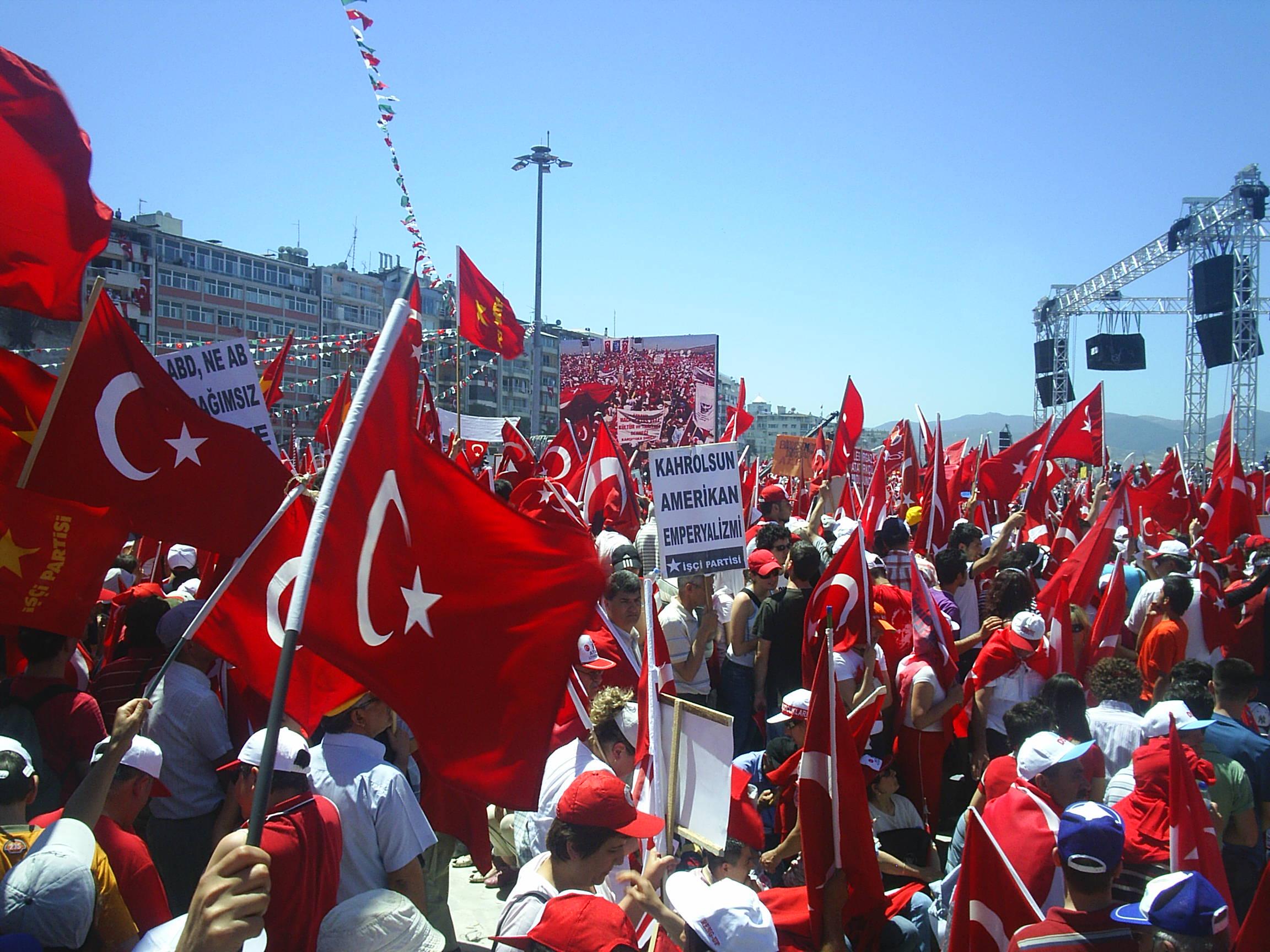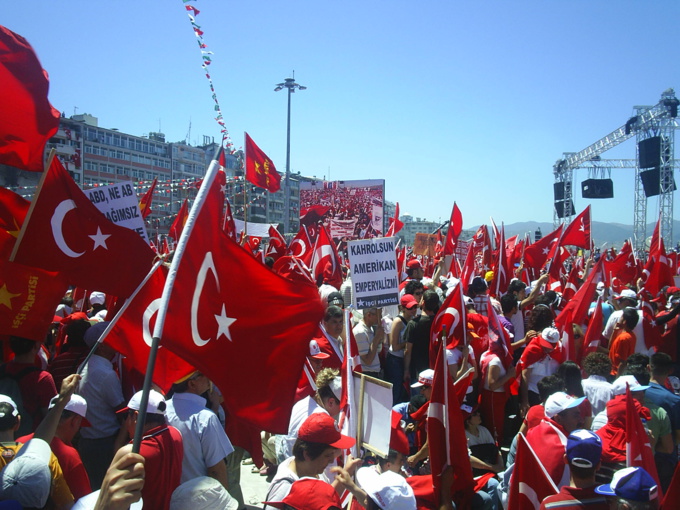The unprecedented scandal on the eve of the parliamentary elections on March 15 was triggered by actions of the Dutch authorities against two members of the Turkish government - Minister for Family and Social Policy Fatma Betül Sayan Kaya and Head of the Ministry of Foreign Affairs Mevlüt Çavuşoğlu.
Group of cars escorting Fatma Betül Sayan Kaya, who entered territory of the kingdom from Germany to participate in a rally in support of the referendum on the new Turkish constitution, was stopped near the Turkish consulate in Rotterdam on Saturday evening. Ms. Sayan Kaya had no chance to speak before the Turkish diaspora as she was forced to go back to the border and leave the kingdom accompanied by the police. Dutch Prime Minister Mark Rutte called Ms. Sayan Kaya’s decision to come to the country for referendum campaigning "irresponsible" (the Dutch authorities declared her "undesirable foreigner").
A few hours earlier, Mevlüt Çavuşoğlu, Turkish Minister of Foreign Affairs, could not fly to Rotterdam to participate in a rally of the Turkish community. The Dutch authorities did not permit his aircraft in the country.
As a result, Minister for Family and Social Policy, deported from the Netherlands, called the kingdom authorities "fascists", accusing them of violating international law.
President Erdogan immediately supported his ministers, and called the Netherlands’s position "relics of fascism and Nazism". In response, Prime Minister Rutte called statements of the Turkish leader an "insanity, crossing all borders."
The war of words went further. Indignant representatives of the Turkish community took to the streets, so the rally had to be dispersed by special forces near the Turkish consulate in Rotterdam.
The referendum scheduled for April 16 in Turkey should approve a package of amendments to the country's basic law. The amendments, if supported, will allow transition from parliamentary to presidential form of government and further consolidation of power in hands of the country's President Recep Tayyip Erdogan. Citadels of the European liberal democracy, however, see this as a threat of further sliding of Turkey towards authoritarianism.
Given growing disagreement on fundamental issues of bilateral relations, the war of words between Turkey and the Netherlands erupted before the incident with the Foreign Minister’s plane and expulsion of the Minister for Family Affairs and Social Policy.
Authorities of the kingdom banned rallies with participation of Mevlüt Çavuşoğlu in Rotterdam and other Dutch cities, and President Recep Tayyip Erdogan raised the bar of confrontation to an unprecedented height. "From now on, let's see how your planes will land in Turkey ... Support the terrorists as much as you like."
The Nethderlands has already become the second EU state, which Mr. Erdogan accused of Nazism. Before that, the President of Turkey said the same about Germany because of banned rallies with participation of Turkish officials.
Extremely harsh reaction from Chancellor Angela Merkel and other leaders of Germany did not impressed President Erdogan, and he continued denouncing European politicians.
In addition to Holland and Germany, rallies organized by the ruling Turkish Justice and Development Party were abolished in Austria and Switzerland. On Sunday, Prime Minister of Denmark Lars Løkke Rasmussen proposed to postpone visit of the Turkish Prime Minister Binali Yildirim. He admitted that he took this decision out of solidarity with the Dutch authorities.
Position of France is an exception to this background. The authorities of this country did not prohibit a rally with participation of Mevlüt Çavuşoğlu, held in the city of Metz. A representative of the French Foreign Ministry commented: "The fact that the Turkish minister was given an opportunity to hold a meeting corresponds to the principle of freedom of assembly." However, the Turkish minister slightly abused this freedom, calling France’s ally, the Nethderland, "the capital of fascism".
source: reuters.com
Group of cars escorting Fatma Betül Sayan Kaya, who entered territory of the kingdom from Germany to participate in a rally in support of the referendum on the new Turkish constitution, was stopped near the Turkish consulate in Rotterdam on Saturday evening. Ms. Sayan Kaya had no chance to speak before the Turkish diaspora as she was forced to go back to the border and leave the kingdom accompanied by the police. Dutch Prime Minister Mark Rutte called Ms. Sayan Kaya’s decision to come to the country for referendum campaigning "irresponsible" (the Dutch authorities declared her "undesirable foreigner").
A few hours earlier, Mevlüt Çavuşoğlu, Turkish Minister of Foreign Affairs, could not fly to Rotterdam to participate in a rally of the Turkish community. The Dutch authorities did not permit his aircraft in the country.
As a result, Minister for Family and Social Policy, deported from the Netherlands, called the kingdom authorities "fascists", accusing them of violating international law.
President Erdogan immediately supported his ministers, and called the Netherlands’s position "relics of fascism and Nazism". In response, Prime Minister Rutte called statements of the Turkish leader an "insanity, crossing all borders."
The war of words went further. Indignant representatives of the Turkish community took to the streets, so the rally had to be dispersed by special forces near the Turkish consulate in Rotterdam.
The referendum scheduled for April 16 in Turkey should approve a package of amendments to the country's basic law. The amendments, if supported, will allow transition from parliamentary to presidential form of government and further consolidation of power in hands of the country's President Recep Tayyip Erdogan. Citadels of the European liberal democracy, however, see this as a threat of further sliding of Turkey towards authoritarianism.
Given growing disagreement on fundamental issues of bilateral relations, the war of words between Turkey and the Netherlands erupted before the incident with the Foreign Minister’s plane and expulsion of the Minister for Family Affairs and Social Policy.
Authorities of the kingdom banned rallies with participation of Mevlüt Çavuşoğlu in Rotterdam and other Dutch cities, and President Recep Tayyip Erdogan raised the bar of confrontation to an unprecedented height. "From now on, let's see how your planes will land in Turkey ... Support the terrorists as much as you like."
The Nethderlands has already become the second EU state, which Mr. Erdogan accused of Nazism. Before that, the President of Turkey said the same about Germany because of banned rallies with participation of Turkish officials.
Extremely harsh reaction from Chancellor Angela Merkel and other leaders of Germany did not impressed President Erdogan, and he continued denouncing European politicians.
In addition to Holland and Germany, rallies organized by the ruling Turkish Justice and Development Party were abolished in Austria and Switzerland. On Sunday, Prime Minister of Denmark Lars Løkke Rasmussen proposed to postpone visit of the Turkish Prime Minister Binali Yildirim. He admitted that he took this decision out of solidarity with the Dutch authorities.
Position of France is an exception to this background. The authorities of this country did not prohibit a rally with participation of Mevlüt Çavuşoğlu, held in the city of Metz. A representative of the French Foreign Ministry commented: "The fact that the Turkish minister was given an opportunity to hold a meeting corresponds to the principle of freedom of assembly." However, the Turkish minister slightly abused this freedom, calling France’s ally, the Nethderland, "the capital of fascism".
source: reuters.com



















